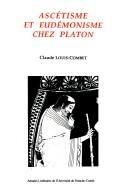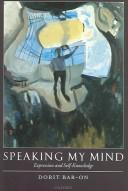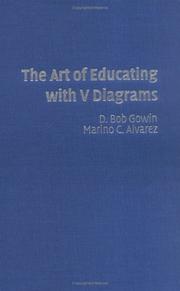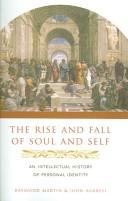| Listing 1 - 7 of 7 |
Sort by
|
Book
ISBN: 9781107123304 9781316401248 9781107558472 1107123305 1107558476 1316401243 1316408973 1316409686 1316409791 1316409902 1316410013 1316410455 9781316410455 9781316409909 9781316410011 Year: 2015 Publisher: Cambridge
Abstract | Keywords | Export | Availability | Bookmark
 Loading...
Loading...Choose an application
- Reference Manager
- EndNote
- RefWorks (Direct export to RefWorks)
In this book, the first systematic study of Socrates's reflections on self-knowledge, Christopher Moore examines the ancient precept 'Know yourself' and, drawing on Plato, Aristophanes, Xenophon, and others, reconstructs and reassesses the arguments about self-examination, personal ideals, and moral maturity at the heart of the Socratic project. What has been thought to be a purely epistemological or metaphysical inquiry turns out to be deeply ethical, intellectual, and social. Knowing yourself is more than attending to your beliefs, discerning the structure of your soul, or recognizing your ignorance - it is constituting yourself as a self who can be guided by knowledge toward the good life. This is neither a wholly introspective nor a completely isolated pursuit: we know and constitute ourselves best through dialogue with friends and critics. This rich and original study will be of interest to researchers in the philosophy of Socrates, selfhood, and ancient thought.
Self (Philosophy) --- Self-knowledge, Theory of. --- Philosophy, Ancient. --- Moi (Philosophie) --- Connaissance de soi --- Philosophie ancienne --- Socrates. --- Self-knowledge, Theory of --- Philosophy, Ancient --- Socrates

ISBN: 2251606262 2848676868 9782251606262 Year: 1997 Volume: 626 79 Publisher: Besançon : Annales littéraires de l'Université de Franche-Comté,
Abstract | Keywords | Export | Availability | Bookmark
 Loading...
Loading...Choose an application
- Reference Manager
- EndNote
- RefWorks (Direct export to RefWorks)
Cet ouvrage qui fut d’abord un travail d’étudiant (1962) a pris tout son sens, au fil du temps, par rapport à une œuvre d’écrivain dont l’auteur pas plus qu’un autre, ne pouvait entendre qu’à propos de Platon le prélude était donné. Des nombreuses fictions qui allaient suivre et des réflexions qui prendraient forme et de l’œuvre opérée dans le champ de la littérature spirituelle, la fondamentale inclination du cœur vers le platonisme ne cesserait jamais de s’avouer comme désir d’unité et d’immobile éternité, comme rêverie androgynique, comme inspiration d’amour, vertige de beauté, passion de réminiscence. Le jeune homme qui réfléchissait sur les rapports dialectiques de l’ascèse et du bonheur chez l’auteur du Banquet, afin de les comparer à l’enseignement de la tradition mystique chrétienne, s’avançait, presque à son insu, sur un chemin d’intériorité qui ne devait le conduire, sans doute, ni à une plus claire connaissance de soi, ni à une illumination théophanique, mais du moins à l’acharnement d’écriture et de création – signifiant par là, s’il était encore besoin de le dire, et dans un cas tout particulier, la permanente fécondité de la parole platonicienne.
Asceticism. --- Hedonism. --- Philosophy, Ancient. --- Classics --- Philosophy --- tradition --- mystique chrétienne --- littérature --- platonisme --- réminiscence --- ascèse --- intériorité --- connaissance de soi --- Ascetisme --- Platon (428-348 av. j.c.) --- Critique et interpretation
Book
ISBN: 9781107017139 9781139062114 9781107540910 9781139518710 1139518712 1280774061 9781280774065 1107017130 1107230616 1139508164 9786613684837 1139517783 1139062115 1139515209 1139514288 113951685X 1107540917 Year: 2012 Publisher: New York : Cambridge University Press,
Abstract | Keywords | Export | Availability | Bookmark
 Loading...
Loading...Choose an application
- Reference Manager
- EndNote
- RefWorks (Direct export to RefWorks)
"Language users ordinarily suppose that they know what thoughts their own utterances express. We can call this supposed knowledge minimal self-knowledge. But what does it come to? And do we actually have it? Anti-individualism implies that the thoughts which a person's utterances express are partly determined by facts about their social and physical environments. If anti-individualism is true, then there are some apparently coherent sceptical hypotheses that conflict with our supposition that we have minimal self-knowledge. In this book, Anthony Brueckner and Gary Ebbs debate how to characterize this problem and develop opposing views of what it shows. Their discussion is the only sustained, in-depth debate about anti-individualism, scepticism and knowledge of one's own thoughts, and will interest both scholars and graduate students in philosophy of language, philosophy of mind and epistemology"--
Connaissance de soi --- Individualisme --- Scepticisme --- Philosophie du langage --- Self-knowledge, Theory of. --- Individualism. --- Skepticism. --- Language and languages --- Philosophy. --- Individualism --- Self-knowledge, Theory of --- Skepticism --- Scepticism --- Unbelief --- Agnosticism --- Belief and doubt --- Free thought --- Introspection (Theory of knowledge) --- Knowledge, Reflexive --- Knowledge of self, Theory of --- Reflection (Theory of knowledge) --- Reflexive knowledge --- Knowledge, Theory of --- Personality (Theory of knowledge) --- Self (Philosophy) --- Economics --- Equality --- Political science --- Self-interest --- Sociology --- Libertarianism --- Personalism --- Persons --- Philosophy --- Connaissance de soi. --- Individualisme. --- Scepticisme. --- Philosophie du langage. --- Arts and Humanities

ISBN: 0199276285 0199263205 0191602892 1281198439 0191532428 9786611198435 1435622219 9780199276288 9781435622210 9780199263202 9780191532429 Year: 2004 Publisher: Oxford Clarendon
Abstract | Keywords | Export | Availability | Bookmark
 Loading...
Loading...Choose an application
- Reference Manager
- EndNote
- RefWorks (Direct export to RefWorks)
Dorit Bar-On develops and defends an original view of avowals and self-knowledge which offers systematic answers to many persistent questions concerning our ability to know our own minds. According to Bar-On's Neo-Expressivist view, avowals - those everyday spontaneous pronouncements that we make about our own present states of mind - are acts through which we directly express, rather than merely report, the very mental conditions the avowals ascribe. Verbal acts of speaking ourminds are thus similar to natural expressions, such as sighing, or smiling; they show, rather than simply telling of
Connaissance de soi [Theorie de la ] --- Introspection (Theory of knowledge) --- Knowledge [Reflexive ] --- Knowledge of self [Theory of ] --- Reflexive knowledge --- Self-knowledge [Theory of ] --- Zelfkennis [Theorie van de ] --- Philosophical anthropology --- Theory of knowledge --- Philosophy of language --- Self-knowledge, Theory of --- Knowledge, Reflexive --- Knowledge of self, Theory of --- Reflection (Theory of knowledge) --- Knowledge, Theory of --- Personality (Theory of knowledge) --- Self (Philosophy) --- Self-knowledge, Theory of.

ISBN: 9780511614507 9780521843430 9780521604147 0511614500 9780511345135 0511345135 1281108464 9781281108463 0511344384 9780511344381 052184343X 0521604141 1107151783 9781107151789 9786611108465 6611108467 0511344791 9780511344794 0511567545 9780511567544 051134399X Year: 2005 Publisher: Cambridge New York Cambridge University Press
Abstract | Keywords | Export | Availability | Bookmark
 Loading...
Loading...Choose an application
- Reference Manager
- EndNote
- RefWorks (Direct export to RefWorks)
This book focuses on the mind and its ability to seek answers to unknown or unanswered questions. The theory of educating provides the grounding for using V diagrams by students, educators, researchers, and parents. Teachers make lesson plans using V diagrams and concept maps. They become expert coaches in guiding student performances. Students learn to construct their own knowledge. They change from question-answerers to question-askers. Parents share meaning with their children and their children's teachers and administrators. Administrators monitor programs and are in touch with all participants in schools and universities. Researchers and evaluators can share records of events and facts. With this theory working in the classrooms and laboratories of many practical places of educating plus extending into the world of technology literacy, The Art of Educating with V Diagrams explains how educating works.
Learning. --- Self-knowledge, Theory of. --- Education --- Introspection (Theory of knowledge) --- Knowledge, Reflexive --- Knowledge of self, Theory of --- Reflection (Theory of knowledge) --- Reflexive knowledge --- Knowledge, Theory of --- Personality (Theory of knowledge) --- Self (Philosophy) --- Learning process --- Comprehension --- Philosophy. --- Apprentissage --- Connaissance de soi --- Philosophie --- Health Sciences --- Psychiatry & Psychology

ISBN: 0231137443 0231510675 9780231137447 0231137451 1280598190 9786613628022 9780231510677 9780231137454 9781280598197 6613628026 Year: 2006 Publisher: New York, N.Y. Columbia University Press
Abstract | Keywords | Export | Availability | Bookmark
 Loading...
Loading...Choose an application
- Reference Manager
- EndNote
- RefWorks (Direct export to RefWorks)
Psychology --- Self (Philosophy) --- Self-knowledge, Theory of. --- Identity (Philosophical concept) --- Moi (Philosophie) --- Connaissance de soi --- Identité --- PHILOSOPHY --- Mind & Body --- Self-knowledge, Theory of --- Ego --- Self Concept --- Philosophy --- Self Psychology --- Psychoanalytic Theory --- Humanities --- Personality Development --- Psychological Theory --- Personality --- Psychological Phenomena and Processes --- Behavior and Behavior Mechanisms --- Psychiatry and Psychology --- Speculative Philosophy --- Philosophy & Religion --- Identity (Philosophical concept). --- Self (Philosophy). --- Identité --- Identity --- Introspection (Theory of knowledge) --- Knowledge, Reflexive --- Knowledge of self, Theory of --- Reflection (Theory of knowledge) --- Reflexive knowledge --- Comparison (Philosophy) --- Resemblance (Philosophy) --- Knowledge, Theory of --- Personality (Theory of knowledge)
Book
ISBN: 9781316502334 9781107042926 9781107337619 9781461950875 1461950872 1107337615 1107042925 1107502942 1139893602 1107501350 1107506719 1107517109 1107497396 1107504023 1316502333 Year: 2013 Publisher: New York
Abstract | Keywords | Export | Availability | Bookmark
 Loading...
Loading...Choose an application
- Reference Manager
- EndNote
- RefWorks (Direct export to RefWorks)
Self-knowledge is commonly thought to have become a topic of serious philosophical inquiry during the early modern period. Already in the thirteenth century, however, the medieval thinker Thomas Aquinas developed a sophisticated theory of self-knowledge, which Therese Scarpelli Cory presents as a project of reconciling the conflicting phenomena of self-opacity and privileged self-access. Situating Aquinas's theory within the mid-thirteenth-century debate and his own maturing thought on human nature, Cory investigates the kinds of self-knowledge that Aquinas describes and the questions they raise. She shows that to a degree remarkable in a medieval thinker, self-knowledge turns out to be central to Aquinas's account of cognition and personhood, and that his theory provides tools for considering intentionality, reflexivity and selfhood. Her engaging account of this neglected aspect of medieval philosophy will interest readers studying Aquinas and the history of medieval philosophy more generally.
Self-knowledge, Theory of. --- Connaissance de soi --- Thomas, --- Self-knowledge, Theory of --- Introspection (Theory of knowledge) --- Knowledge, Reflexive --- Knowledge of self, Theory of --- Reflection (Theory of knowledge) --- Reflexive knowledge --- Knowledge, Theory of --- Personality (Theory of knowledge) --- Self (Philosophy) --- Akʻvineli, Tʻoma, --- Akvinietis, Tomas, --- Akvinskiĭ, Foma, --- Aquinas, --- Aquinas, Thomas, --- Foma, --- Thomas Aquinas, --- Tʻoma, --- Toma, --- Tomas, --- Tomasu, --- Tomasu, Akwinasu, --- Tomasz, --- Tommaso, --- Tʻovma, --- Тома, Аквінський, --- תומאס, --- תומס, --- اكويني ، توما --- Akʻvineli, Tʻoma, --- Akvinskiĭ, Foma, --- Tʻoma, --- Tʻovma, --- Тома, Аквінський, --- תומאס, --- תומס, --- اكويني ، توما --- Ākvīnās, Tūmās, --- اكويني، توما, --- آکويناس، توماس, --- Arts and Humanities --- Philosophy --- Thomas, - Aquinas, Saint, - 1225?-1274
| Listing 1 - 7 of 7 |
Sort by
|

 Search
Search Feedback
Feedback About UniCat
About UniCat  Help
Help News
News